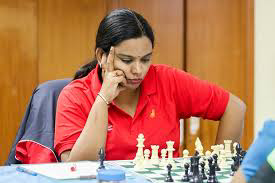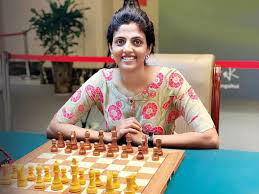Inspiring the Next Generation: Indian Women Chess Grand Master and the Growing Influence of Female Players
Indian women chess grand master first :-
The first Indian woman to achieve the title of Grandmaster in chess is Subbaraman Vijayalakshmi. She earned the title in 2001.
Subbaraman vijayalakshmi life journey :-
Subbaraman Vijayalakshmi, born on March 25, 1979, in Chennai, India, is a chess player who has made significant contributions to Indian chess. She became the first Indian woman to achieve the Grandmaster title in 2001. Vijayalakshmi began her chess journey at a young age, showing promise and dedication to the game.
Throughout her career, she has represented India in various international chess tournaments and Olympiads. Vijayalakshmi has also won multiple national championships, showcasing her prowess in Indian chess. Her achievements include winning the Asian Women's Chess Championship in 2000 and 2015.
Vijayalakshmi's success has not only made her a trailblazer for women in Indian chess but has also inspired aspiring chess players across the country. Her journey continues to be a source of motivation for those pursuing excellence in the game.
More females chess grand master in india famous :-
Apart from Subbaraman Vijayalakshmi, several other Indian female chess players have achieved the title of Grandmaster and gained recognition for their accomplishments. Some notable female Grandmasters from India include:
Humpy Koneru:
One of the strongest female chess players globally, Humpy Koneru, achieved the title of Grandmaster in 2011. She has consistently been among the top-ranked women players and has represented India in numerous international competitions.
Born: March 31, 1987, in Gudivada, Andhra Pradesh, India.
Achievements: Became a Grandmaster in 2011. Recognized as one of the top women chess players globally. Multiple-time national champion. Represented India in numerous international competitions.
Won a bronze medal at the Women's World Chess Championship in 2010.
Humpy Koneru, also known as Koneru Hampi, has consistently been a top performer in various international chess tournaments, contributing to India's chess reputation.
Dronavalli Harika:
Harika became the second Indian woman to achieve the Grandmaster title in 2011. She has been a prominent figure in women's chess, winning several national championships and representing India in various team events.
Born: January 12, 1991, in Guntur, Andhra Pradesh, India.
Achievements: Achieved the Grandmaster title in 2011. Represented India in various team events, including the Olympiads. Multiple-time national champion. Known for her strategic and tactical prowess.
Won a bronze medal at the Women's World Chess Championship in 2015.
Has been a key player in the Indian women's team, contributing to their success in team events.
Tania Sachdev:
Tania Sachdev earned the Woman Grandmaster title in 2005 and later achieved the title of International Master. While she hasn't attained the Grandmaster title, Tania has been a key figure in Indian women's chess, winning multiple national championships.
August 20, 1986, in Delhi, India.
These players have left a lasting impact on Indian chess, breaking barriers and serving as role models for aspiring chess enthusiasts, especially women, in the country.
Achievements:
Earned the Woman Grandmaster title in 2005. Notable for her contributions to Indian women's chess. Winner of multiple national championships. Represents India in international competitions.
Legacy
The legacy of Indian female chess players extends beyond their individual achievements and medals. These players have collectively contributed to the growth and recognition of women's chess in India. Some aspects of their legacy include:
Inspiration for Future Generations:
Female chess players like Subbaraman Vijayalakshmi, Humpy Koneru, and others serve as role models, inspiring young girls to take up chess and pursue excellence in the game.
International Representation:
Through their participation in prestigious international tournaments and Olympiads, these players have showcased India's strength in women's chess on the global stage.
Breaking Stereotypes:
Their success has played a crucial role in breaking gender stereotypes in chess, traditionally considered a male-dominated sport. They have demonstrated that women can compete at the highest levels.
Elevating Chess in India:
The success of these players has contributed to the overall growth and popularity of chess in India. Their achievements have brought attention to the sport, encouraging more people to engage with and appreciate chess.
Mentoring and Coaching:
Several of these players, as part of their legacy, have become mentors and coaches, passing on their knowledge and experience to the next generation of chess players in India.
Advocacy for Women in Chess:
These players have advocated for gender equality in chess and have been vocal about the need for more opportunities and recognition for women in the chess community.
Overall, the legacy of Indian female chess players is multifaceted, encompassing their individual accom
plishments, impact on the chess community, and their roles as ambassadors for the sport in India.
These players, along with others, have significantly contributed to the growth and success of women's chess in India. Their achievements have inspired a new generation of female chess players in the country.
Represented India in multiple Olympiads and other international competitions, contributing to the team's performance.
These achievements showcase the excellence of Indian female chess players on both individual and team levels in various international competitions. For the most recent and detailed information, it's recommended to check the latest chess tournament results and official chess federation records.




Comments
Post a Comment